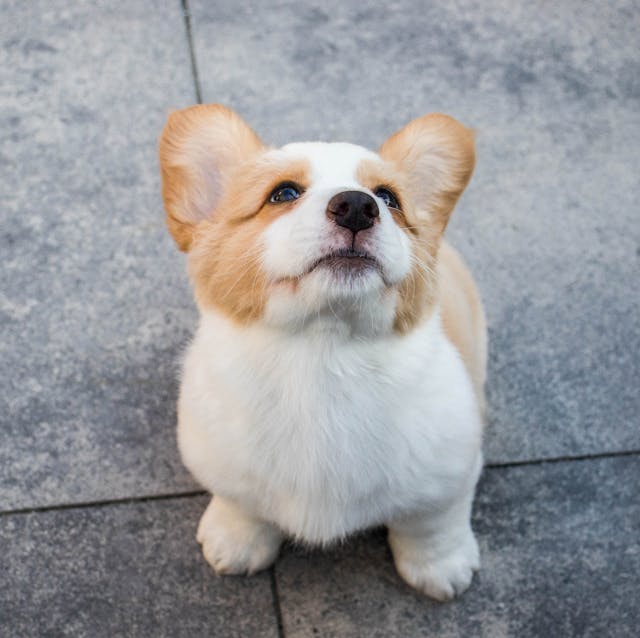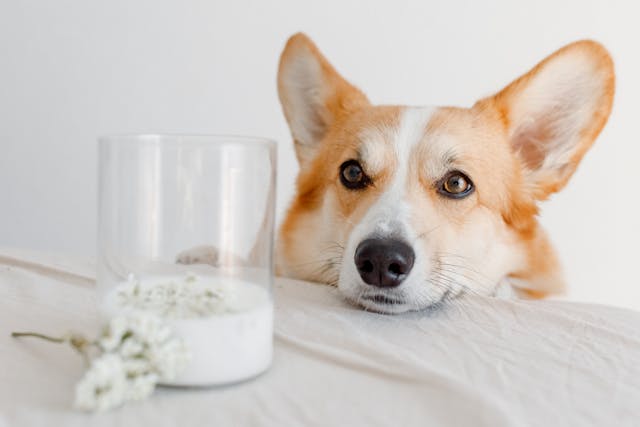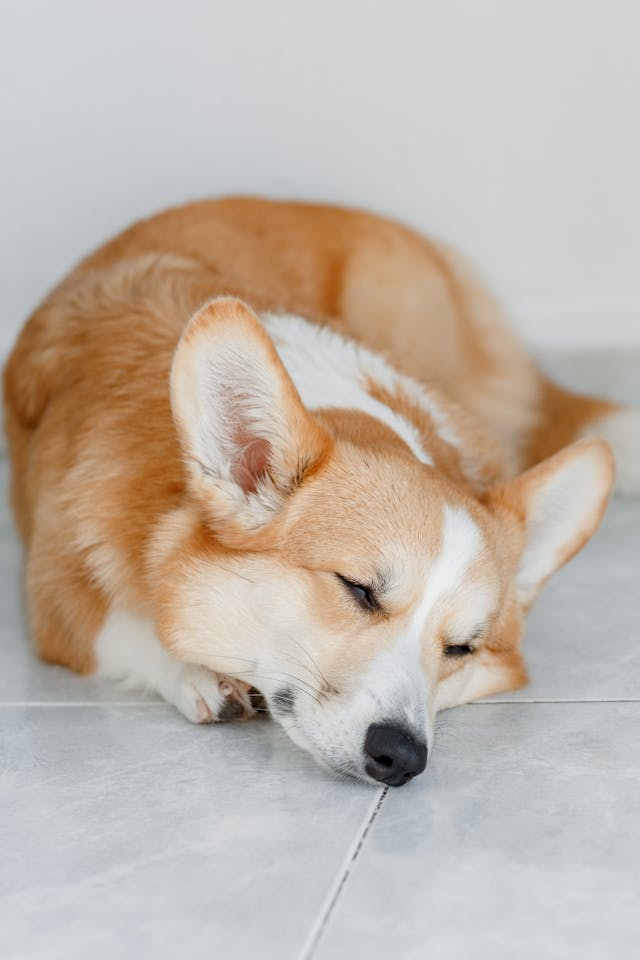Bringing home an 8-week-old Corgi is one of the most exciting experiences for any dog lover. At this adorable age, your new pup is brimming with curiosity and energy, eager to explore the world and bond with you. However, raising a Corgi puppy involves more than just cuddles and play—it’s about understanding their needs and laying a strong foundation for their future. This guide will walk you through everything you need to know to raise a happy and healthy Corgi. How Much to Feed Your Corgi Puppy: Diet plan , stages more…
Table of Contents
Physical Traits and Early Development
At eight weeks old, Corgi puppies weigh between 4 to 6 pounds and are starting to show off their iconic long bodies and short legs. Their floppy ears might not yet have perked up, but don’t worry—they’re like little antennae that need time to tune into full Corgi mode. Before you know it, they’ll be standing tall, eavesdropping on all your conversations.

Corgis come in two breeds:
- Pembroke Welsh Corgi
- Cardigan Welsh Corgi
Both breeds share a double coat that helps protect them from the elements. While they’re still developing their adult coats, you might notice some shedding as they grow.
How Big Is an 8-Week-Old Corgi?
At this stage, Corgi puppies typically weigh between 4 to 6 pounds and measure around 6 to 8 inches tall at the shoulder. While they’re small now, they’re full of personality and growing quickly. Size can vary slightly depending on genetics and overall health.
Milestones to Watch
- Teething: Puppies at this age love to chew—it’s their way of soothing sore gums. (Pro tip: Hide your favorite shoes unless you want custom Corgi bite marks!)
- Mobility: They’re getting better at walking and might even surprise you with bursts of zoomies.
- Social Skills: Your puppy is learning to interact with humans and other pets.
| Developmental Milestones Table | |
|---|---|
| Age | Milestone |
| —————– | ———————————— |
| 6-8 weeks | Exploring surroundings |
| 8 weeks | First vaccination and vet visit |
| 10-12 weeks | Improved socialization skills |
| 4-6 months | Teething and chewing increases |
Feeding Your Corgi Puppy
Feeding your puppy the right food is critical to their growth and development. At eight weeks old, they need nutrient-dense puppy food tailored for small to medium breeds. Look for formulas rich in protein, omega-3 fatty acids, and DHA to help support their brain and body development.

Feeding Routine
- Offer 3 to 4 small meals per day.
- Serve 1/4 to 1/2 cup per meal, depending on their weight and activity levels.
- Always keep fresh, clean water available.
How Much Food for an 8-Week-Old Corgi?
Corgi puppies should eat about 1 to 1.5 cups of puppy food daily, divided into multiple meals. Stick to high-quality commercial puppy food and avoid table scraps or human food—these can upset their sensitive stomachs. (No, they don’t need a bite of your pizza, even if their puppy eyes beg to differ.)
How to Tell if a Corgi Puppy Is a Fluffy?
Some Corgis are born with a genetic trait that gives them a longer, fluffier coat than standard Corgis. These “fluffies” are easy to identify by their soft, feathered fur, especially around the ears, chest, and tail. If you’re not sure, a DNA test can confirm whether your Corgi carries the fluffy gene. (Fluffies are the glamour models of the Corgi world!)
Training and Socialization Basics
Corgis are smart and love to learn, making them a joy to train. Start teaching them good habits early to prevent any unwanted behaviors.
Essential Training Tips
- House Training: Establish a consistent potty routine and praise your puppy when they go in the right spot. Patience is key—puppies aren’t born knowing what a rug is for!
- Crate Training: Introduce them to a crate as their safe space. It helps with potty training and gives them a cozy place to relax.
- Basic Commands: Teach simple commands like “sit,” “stay,” and “come” using positive reinforcement techniques.

Encouraging Socialization
Expose your puppy to a variety of experiences, including meeting new people and pets. Take them on short trips to safe places and let them hear everyday sounds like the vacuum cleaner or doorbell. This builds their confidence and prevents fear-based behaviors. (And yes, they might bark at the vacuum—it’s the sworn enemy of all Corgis!)
Why Are Corgi Puppies So Expensive?
If you’ve been shopping for a Corgi, you’ve probably noticed the high price tag. Here’s why:
- Responsible Breeding: Ethical breeders invest in health tests, quality care, and socialization.
- Popularity: Corgis are in high demand, which drives up their cost.
- Care Costs: Vaccinations, proper nutrition, and vet visits add to the overall price.
| Corgi Puppy Costs Breakdown | |
| Cost Factor | Details |
| —————————– | —————————- |
| Breeder Costs | Health checks and care |
| Popularity | High demand, limited supply |
| Long-term Care | Vaccinations, diet, etc. |
Health Checkups and Preventative Care
Your 8-week-old Corgi should already have their first vaccinations and deworming. Schedule a vet checkup to ensure they’re healthy and on track with their vaccine schedule.
Common Health Tips
- Joint Care: Protect your puppy from jumping off furniture to avoid stress on their developing joints.
- Ear Cleaning: Check and gently clean their ears weekly.
- Weight Management: Don’t overfeed—a healthy weight is essential for avoiding future health issues.
Play and Exercise Needs
Even as puppies, Corgis are energetic and need daily playtime. Keep sessions short and fun to match their stamina levels.
Fun Activities
- Chew Toys: Perfect for teething and keeping your puppy entertained. (Bonus: It saves your furniture!)
- Short Walks: Limit to 5-10 minutes at a time, gradually increasing as they grow.
- Interactive Games: Simple games like fetch or hide-and-seek help stimulate their minds and strengthen your bond.

Grooming and Maintenance
Getting your Corgi used to grooming at an early age will make it easier as they grow. Their double coat requires regular upkeep to stay healthy.
Grooming Checklist
- Brushing: Brush their coat 2-3 times a week to reduce shedding.
- Bathing: Use a mild puppy-safe shampoo and bathe only when necessary.
- Nail Trimming: Trim nails every few weeks to prevent overgrowth.
- Dental Hygiene: Begin brushing their teeth with a puppy toothbrush. (Yes, doggy toothpaste is a thing!)
Building a Strong Bond
Your puppy looks to you for guidance and comfort. Spending time with your Corgi and showing them love and consistency is the best way to strengthen your relationship.
Creating a Happy Environment
- Stick to a routine: Puppies thrive on predictability.
- Provide a safe space: A crate or cozy bed helps them feel secure.
- Celebrate good behavior: Use treats, praise, and affection to reinforce positive actions.
Final Thought
Welcoming an 8-week-old Corgi into your life is a heartwarming journey filled with joyful moments and rewarding challenges. By understanding their unique needs and providing consistent care, you’re giving them the best start in life. Treasure these early days, as they’ll set the tone for a lifelong bond with your furry companion. (And don’t forget—Corgi cuddles are the best kind of therapy!)
5-Month-Old Corgi: The Cutest Pup Phase You Can’t Miss!
6-Month-Old Corgi: Care & Tips for Happy Growth
Protect Your Anatolian Shepherd: Health Issues to Watch For
How My Personal Experience with a Corgi Turned My Life Upside Down

